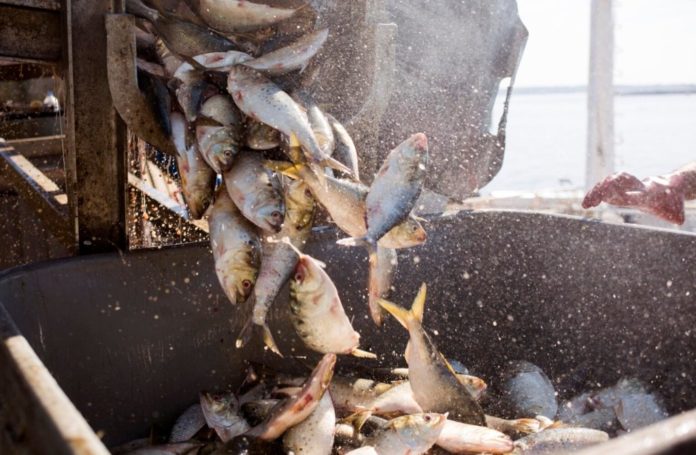I am a fly fishing angler, guide and lodge owner who experiences climate change every day through my work on the water. My businesses are located in Maine and the Bahamas, where both locations are rapidly evolving as a result of climate change. The impacts of rising sea levels, warming water and the shifting stocks of fish are more evident each year.
Atlantic menhaden are unloaded at Coastal Bait on the Portland waterfront in 2016. Among the provisions in a proposed update to the Magnuson-Stevens Act is a requirement that all fishery management plans protect forage fish such as menhaden. Brianna Soukup/Staff Photographer
We need to safeguard our diverse fishing habitats, estuaries and fisheries, to make sure our great-grandchildren and their children can fish in the future.
Climate change impacts are having a profound impact on the shoreline, on fish habitat and on the fish we catch and release and/or eat.
The Magnuson-Stevens Fishery Conservation and Management Act is the nation’s premier marine fishing law. After a yearlong listening tour, a bill to make improvements to the Magnuson-Stevens Act has been introduced by Reps. Jared Huffman, D-Calif., and Ed Case, D-Hawaii. The Sustaining America’s Fisheries for the Future Act has the climate-ready provisions we need to protect our fisheries.
As an active angler, I would like to speak out in favor of this legislation, as it offers a bold and comprehensive update to the Magnuson-Stevens Act, recommits to sustainable management and readies our fisheries for the impacts of climate change.
The proposals in the Sustaining America’s Fisheries for the Future Act would enhance our ocean’s long-term ability to provide food and support businesses, recreation, culture and thriving coastal communities. Key bill provisions include:
• Preparing fisheries for climate change. The bill incorporates climate considerations throughout the management process, ramps up production of climate-relevant science and data and creates mechanisms to produce climate-ready management decisions addressing shifting stock challenges.
Gulf of Maine waters are warming of the world’s oceans. Michael Carlowicz of NASA’s Earth Observatory has written about it in an article headlined “Watery heatwave cooks the Gulf of Maine,” available at nasa.gov.
The reality of these warming waters means shifting fish stocks. For example, seeing Atlantic bonito in our waters is not an uncommon sight now, and black sea bass continue to march north into the Gulf of Maine. Striped bass are staying longer in the season as a result of the warming Northern waters, not to mention, lobster have been moving north for decades.
• Rebuilding fish stocks. Plans to bring fish populations back to healthy levels are more important than ever before in light of climate change impacts. We need to both address climate impacts in the Magnuson-Stevens Act and bolster stock rebuilding in the law. We need to ensure efforts to bring fisheries back to sustainable levels are effective and stay on track, as well as build more accountability into the system for when such efforts fail while keeping stocks from becoming overfished in the first place. In our region, cod is an example of a stock that has struggled to rebuild under the current plan.
• Protecting forage fish. The bill requires the consideration of predator needs in existing fishery management plans, such as the relationship of Atlantic menhaden as a forage fish for whales, tuna, bluefish, striped bass, osprey and other species. Other examples in our area include how an abundance of forage fish such as peanut bunker (immature Atlantic menhaden), squid, bay anchovies and sand eels create an outstanding striped bass and bluefish bite in our bays, estuaries and ocean.
• Enhanced data collection. The legislation requires the National Oceanic and Atmospheric Administration to establish guidelines to improve recreational catch data and to integrate data from multiple sources and promotes research on innovation, like electronic recording of recreational catch and effort data, as well as the updating of data management systems to improve collection, intake and storage of and access to data from federal and nonfederal sources.
I urge anglers and members of Congress in Maine to support the Sustaining America’s Fisheries for the Future Act. It addresses angler needs today and, more importantly, in the future, as fisheries need to change in response to climate impacts.
« Previous
Related Stories
Latest Articles
-
Letters
-
Letters
-
Community News
-

Editorials
-
Community News
Credit: Source link

































Invalid username/password.
Please check your email to confirm and complete your registration.
Use the form below to reset your password. When you’ve submitted your account email, we will send an email with a reset code.